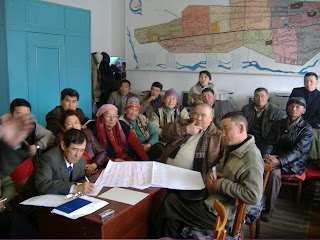
A frequent theme on this blog is the "performance" culture which has overtaken British government. Target-setting, measurement, reward and punishment sometimes sound like the Fordist management which we were supposed to have left behind.
In relation to Gordon Brown's threat of having 1,000 "failing" schools "taken over", I said I would summarise the 3 year research project which ran from 2002-05 in th UK following the attempts to "turnaround" 15 or so English municipalities which were judged to be failing. I will cheat a bit - and use text from the project's First Annual Report of 2004. The italicised references show the confusing fequecy with which government has introduced new and better programmes. Little wonder that there has been cynicism and confusion - this was happening at the same time municipalities were being hit with other bright ideas from above - new governing arrangement, scrutiny processes etc
"The desire by central government level to improve the performance of local authority services has increased in the last 20 years. Policy initiatives moved from the relatively simplistic assumptions about the power of market forces that were inherent in Compulsory Competitive Tendering (CCT) through more comprehensive service review and procurement approaches in Best Value and then into a range of demonstration and incentive initiatives including Beacon Councils, and Local Public Service Agreements.
The introduction of a nation-wide performance assessment process - the Comprehensive Performance Assessent (CPA) – has revealed that some councils are unable to respond effectively to the improvement agenda. Councils are classified into one of five performance bands (excellent, good, fair, weak and poor. Councils classified as poor are subject to special monitoring by central government and the Audit Commission, and may be the focus of legal intervention to direct them to undertake certain tasks or transfer responsibility for a function to a nominee of the Secretary of State".
"The evidence that a group of councils that is under-performing relative to national expectations raises two important questions:
1. Why do local authorities becoming poor performers?
2. What approaches to recovery (or turnaround) work most effectively and in what situations?
"There is little scientific research into these issues as they bear on the public sector. What literature there is tends to focus on failures in policy implementation (i.e. why a given policy is not delivered as intended or does not have the effect that was intended, e.g. Bovens, et al 2001; Bovens and t’Hart 1998; Wildavsky 1984) rather than weaknesses of organisational performance. The research into organisational performance in the UK public sector primarily concentrates on schools, reflecting the school effectiveness/school improvement debate (e.g. Gray et al 1999; Willmott 1999), although there is also some with a broader base (e.g. Anheier 1999).
"In contrast to the paucity of public sector research there is a voluminous and largely US-oriented private sector literature. This tends to focus on the way in which organisational leadership fails to respond to environmental changes affecting business profitability, and prescriptions are largely related to chief executive changes or organisational restructuring (e.g. divestment, re-financing, re-positioning, etc.) (e.g. Barker and Mone 1998; Boyne et al 2003; Mellahi 2002).
"‘Learning from the Experience of Recovery’ - was commissioned by the Office of the Deputy Prime Minister (ODPM), Local Government Association (LGA), Audit Commission, and Improvement and Development Agency (IDeA). The evaluation was undertaken by the Institute of Local Government Studies (INLOGOV) at the University of Birmingham in association with Cardiff University, MORI and other partners. The study commenced in December 2002 and ran until summer 2005. It involved:
1. evaluation of the recovery process and its impact in five poorly performing case study councils, together with a more limited analysis in another 10 councils
2. a study of the implementation and impact of the policies of government and national agencies in relation to poorly performing councils
3. action-learning sets with managers of the recovery process and recovery projects
4. policy papers on themes and issues related to recovery in poorly performing local authorities
5. dissemination to a range of policy-maker, practitioner and academic audiences.
The first annual report provides early findings from the study, drawing on baseline studies of five ‘poorly performing’ case study councils and on the response of central government and national agencies".
The report certainly gives very useful background history to the efforts of UK central governments to get improvement in both local services and municipalities. And it is relevant to note that the keyword for the past decade has been "improvement". Indeed the Scottish training and consultancy body for local government is actually called Improvement Services






